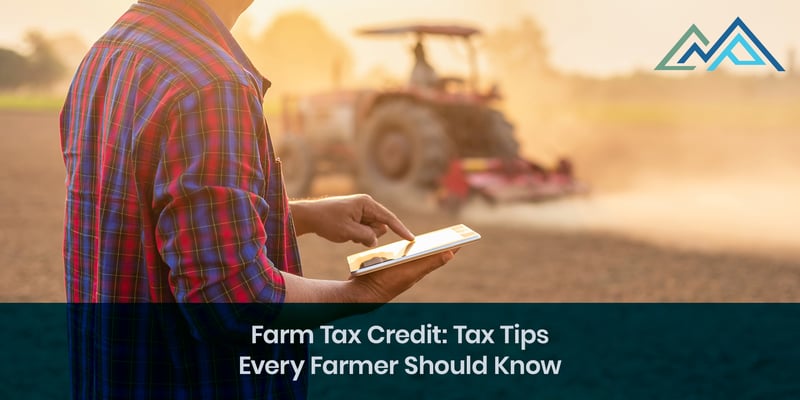How can farmers reduce their taxable income?
It is not uncommon for farmers to have questions about tax law and how to reduce their taxation. Paying too much in income or property tax can reduce the amount of cash you have available and negatively impact your financial future.
We have created this guide with 15 farm tax tips for farmers to help you understand your tax-saving options.

What is Considered a Farm for Tax Purposes?
The first thing we need to clarify is what qualifies as a farm for tax purposes. The US tax code defines a farm as follows:
The term “farm” includes stock, dairy, poultry, fruit, furbearing animal, and truck farms, plantations, ranches, nurseries, ranges, greenhouses or other similar structures used primarily for the raising of agricultural or horticultural commodities, and orchards and woodlands.
Any business or individual that conducts agricultural or horticultural activities may qualify as a farm. Farms that consume what they grow are hobby farms.
If you process your crops or livestock, that portion of your business may not qualify for any farmers’ tax credit. An example would be someone who grows grapes and makes them into wine. That business would be considered a winery or vineyard, not a farm.
You may have some business activities that qualify as ordinary income while others do not. Consult with an experienced farm tax professional to understand your tax deductions and credits related to farming.
Here are 15 tax breaks and tips for farmers.
1. Understand What You Must Report as Income
The first farm tax tip we have for you is understanding farm income. You likely have multiple income streams, and you must report everything to avoid running into problems with your income tax. You must report income from:
- Sales of produce, livestock, grains, and any other farm produce
- Agricultural program payments
- Distributions from a cooperative
- Crop insurance proceeds
- Federal crop disaster payments
- Commodity Credit Corporation loan proceeds (these may be counted as income if you have pledged all or part of your farm’s production as collateral.)
- Gasoline or fuel tax credits or refunds
- Income for custom hire or machine work
Dive into our new blog post, Breaking Down Income Types: How Each Is Taxed, where we simplify income tax complexities. Whether you're a high earner, a newbie, or an entrepreneur, this guide is valuable. We demystify how different income sources are taxed, providing the necessary clarity.
If you own a farm that someone else operates on your behalf, you need to report the rental income you collect from the tenant, although you aren’t required to pay self-employment tax on the rental income. You can get additional information on this from IRS Publication 225. If you own a rental property, be sure to read our blog post about simplifying taxes on rental income.
2. Spend Wisely
Farm income fluctuates from year to year. One way to reduce your tax burden in high-income years is to make expenditures for farm improvement or maintenance projects.
You may buy machinery, animal feed, fertilizer, fuel, seeds, and chemicals. Make sure that any ordinary expenses you deduct are related to your business. You may also be able to deduct lease payments for machinery.
3. Take All Eligible Deductions
Many factors affect the amount of taxes you pay. These may include deductions for a dependent spouse, children, and eligible business expenses.
Work with an experienced farming accountant when filing your taxes. They can help you shift income into years when your deductions are higher to reduce your tax burden while adhering to IRS rules by taking the maximum amount allowed.
4. Use Depreciation Properly
Every farmer uses equipment to run their business. Whether you grow crops, raise livestock, or a combination of the two, the amount you spend on equipment is an ordinary expense.
As part of your farm management and tax strategy, take advantage of depreciation on any equipment you buy for your farm:
- Section 179 of the tax code allows you to take a larger-than-normal tax deduction in the year that you purchase new equipment.
- Bonus depreciation allows you to deduct between 50% and 100% of the cost of new or used equipment purchased depending on the tax year. For 2020, bonus depreciation is 100%.
- If you construct a building, you may be able to deduct the entire cost of construction. Some structures, including equipment barns and machine shops, require a 20-year depreciation period. The period is 10 years for chicken houses, grain bins, livestock barns, and silos.
Deductions can be a tricky thing to navigate when it comes to filing for your taxes and this is certainly true for depreciation. Determining which deductions you can take can be a complex, laborious process. Check our post:
Depreciation cannot make up for purchases you cannot afford. Equipment salespeople may try to convince you to buy equipment to help with your taxes. Buy only what you need and use the proper depreciation to claim the credit.
5. Pay Your Kids to Work
It is common for family farms to have dependent children to help with chores related to the business. If you do so, then you can save money on your taxes by paying your kids to work.
The Tax Cuts and Jobs Act of 2018 nearly doubled the amount of money that a child under 18 may be exempt from federal taxes. Pay your kids to work and they can take the money, tax-free, and put it into an account for school expenses or Roth IRA. You will not be required to withhold payroll taxes if the child is under 18. You do need to follow all payroll rules and requirements when paying your children, including filing Forms 943, W3 and W2 reporting the wages.
6. Track Your Deductible Expenses
Expenses related to the operation and management of your farm may be deducted on Schedule F when you file your taxes. Eligible expenses include:
- Seeds and plants
- Fertilizers and lime
- Chemicals
- Feed
- Veterinary costs for livestock
- Insurance (except health insurance)
- Mortgage interest
- Storage and warehousing of crops and equipment
7. Report Resale of Livestock
If you bought livestock or other items for resale, you must report when you sell them to the IRS. This applies whether you sell them for profit or because drought or bad weather forced you to sell more livestock than intended.
If you made sales due to a federally declared drought, you may be able to defer your taxes for a year.
8. Use Income Averaging
If your farm operates as a Sole Proprietorship, you may be able to use income averaging to reduce your tax burden. In the year you elect to use average income, you can shift some of that year’s income to the three prior years.
You can find a full explanation of income averaging and when you can use it here.
9. Conservation Expenses vs. Farmland Preparation
If you clear land for farming, here are some tips to keep in mind:
- Expenses related to leveling, grading, terracing, diversion and drainage ditches, ponds, brush removal, earth dams, and windbreaks are usually deductible. The caveat is that they must be consistent with an approved NRCS Conservation Plan for your farm, and there’s a 25% gross income limit.
- If you clear timbered land for farm use, you may not deduct the costs of preparing the ground for farming. Instead, add the costs to your basis in the land and you may recover them when you sell the land.
Careful small business tax planning is essential to minimize your tax burden after an expansion.
10. Deduct a Net Operating Loss
In any year where your expenses are more than your income, your farm may have a net operating loss. The IRS allows you to carry that loss over to other years and deduct it.
You may be due a refund of part or all of the income tax you paid in the years before the loss or even a reduction in your taxes in future years.
11. Home Office Deduction
Do you maintain a home office where you do your recordkeeping and other business activities? If you do, you may qualify for the home office deduction on your individual or business tax returns.
To qualify, you must use part of your home exclusively for business. You’ll need to calculate the square footage of your office and provide documentation to claim a percentage of your mortgage or rent as a deduction.
You can find additional information here.
12. Claiming Fuel Credits
As a farmer, you may have a fuel tax exemption. The fuel tax applies only to highway use but, due to the difficulty of separating taxable uses from non-taxable uses, nearly all fuel sold in the US is taxed.
Where the fuel is used is the most common determining factor of whether fuel use is taxable. Fuel used on the highway – to drive cars and trucks – is taxable. Fuel used for most farm operations (tilling the soil, harvesting crops, or planting seeds) is not.
You can find more information about the fuel tax credit here.
13. Renewable Energy Tax Credit
The Renewable Energy Tax Credit applies to individuals and business owners and it provides a tax credit if you add solar panels or other renewable energy generators, such as turbines or water generators, to your farm. The tax credit was renewed in 2015. On your 2019 tax return, you can take a tax credit equal to 30% of your expenses, with the amount reduced to 26% in 2020 and 22% in 2021. You may take the credit starting in any year when construction has begun on solar panels.
This is not a refundable credit. That means if you apply for the credit and your deductions exceed your taxable income, you will not be eligible for a refund against the credit. You can find additional information here.
14. Agricultural Research & Development Tax Credit
One of the most overlooked tax credits for farmers is the R&D tax credit. The Research & Development (R&D) tax credit was designed to offset expenses associated with research and innovation. To make the most of this opportunity, it’s important to understand what expenses qualify for R&D tax credit, as many farm activities already meet the criteria.
You may be eligible if you engaged in any of the following activities:
- Plant cover crops
- Use new or experimental fertilizers or soils
- Develop new feeding techniques or feed formulas for livestock
- Develop new or improved harvest techniques
- Innovate new pesticides to protect crops
You can use IRS Form 6765 to get instructions on how to calculate the credit.
15. Repayment of Loans
Have you taken out a bank loan to get capital for your farming business? If the answer is yes, then you may qualify to deduct the interest on your business tax return.
However, there are some restrictions. This deduction does not apply to non-traditional loans. If you borrowed money from a friend to repair buildings on your farm, the amount you spent on interest is not deductible. You can find additional information here.
Conclusion
Filing taxes as a farmer can be stressful and confusing. This farm tax deductions list will help you complete your tax return and minimize income and property tax. One of the benefits of working with 'farming accountants' is that we've been there, done that. In other words, we can use our experience to ensure your finances are in order.
At CMP, we can help you find the best opportunities for tax deductions on your farm. We understand that reducing your tax burden is a top priority. We are prepared to support you in that goal.
Need help with your taxes? Contact CMP to learn how we can help you retain more of what you earn with our proactive tax planning services.

















